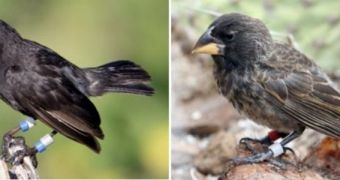Working in the Galapagos Archipelago, where Charles Darwin himself studied the behavior of finches more than 150 years ago, scientists have recently announced that they have managed to capture an elusive moment in the history of a group of birds – the creation of a new species from a new strain. The investigators have revealed that, although Darwin's theory played a major role in predicting the conditions necessary for the split, an important part in the process was played by chance, and also by the behavior of single individuals. In the case of the analyzed birds, it all revolved around a song played differently.
In charge of the recent investigation were Peter and Rosemary Grant, a couple that has spent the past 36 years studying the behavior and evolution of a group of birds known simply as Darwin's Finches. Their observations on the miniature evolution are detailed in the Monday issue of the respected journal Proceedings of the National Academy of Sciences (PNAS), Wired reports. The main part of the study was conducted on a medium ground finch, or Geospiza fortis, that came to the island of Daphne Major from another island. The bird fell into the team's nets in 1981, and remained on the island every since.
Soon, it attracted a mate, with which it had five offspring. Their father was much larger than any of the other males on Daphne Major, and also had a different mating song. The song patterns were naturally transmitted to the “sons,” which also started serenading their prospective mates with sounds that were different than those of all other males on the island, except for their “father.” Sadly, before the team could continue its studies, a massive drought killed off all the birds, except for a brother and sister. The two mated, and produced offspring that they themselves multiplied.
After a few years, the Grants could finally say that a new species is in its infancy. Its faith is still unknown. It may be that it will get absorbed into the general population due to interbreeding, or that the lineage will continue with mates from the new group alone. The species may be endangered by the genetic flaws of their limited gene pools, but they may also get rid of some of these flaws due to occasional interbreeding. It is still too early to tell which will be the case, scientists say.

 14 DAY TRIAL //
14 DAY TRIAL //